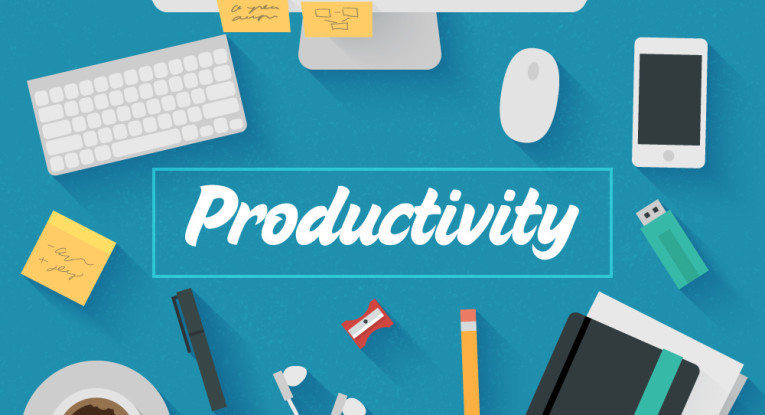14 tips on how to make 2015 the most productive year.

In this article, Rachel Gilet gathered the best productivity tips for 2015.
You probably noticed, we are a little crazy about productivity.
')
We asked the most productive people with whom we worked throughout the year, what they do in their daily lives in order to have so much time. Here is what they said:
1. Visualize and plan your day overnight
Before going to bed, an expert in the field of emotional intelligence and the author of The Other Kind of Smart Harvey Deutschchendorf decides the main things of the next day: what he will wear, eat for lunch and which way he will go to work. “The less time and energy you spend on everyday things, the more you will have them on important things,” he explains.
He also advises presenting exactly what you are going to do the next day. “Put this planning into your daily routine, and you will be surprised how much you manage to accomplish,” he says.
2. Surround yourself with productive people.
“It’s very easy for me to work alone, but I find that productivity is greatest when I surround myself with productive people I don’t know,” says Vivian Giang, a freelance journalist who writes on leadership, organizational psychology and gender issues.
She says that working with productive strangers keeps her in good shape. “I do not view social networks without a goal. I eat healthier foods and don't take long breaks. I sort of compete with them, because they always look as if great ideas are constantly coming to them. ”
3. Work while standing
When Camille Sweeney, the journalist and co-author of “The Art of Doing” ( “The Art of Doing” ), had to interview 15 prominent newsmakers in just a few days, she made calls while standing. “It was the year when I got out of the chair and stood next to the desk,” she says. "The difference is very big."
Before the portable stand-up desk was delivered, Sweeney improvised and put her laptop on a square cardboard box on the desk. Now she alternates between standing and sitting every few hours.
4. Focus on one word per year.
“One word creates simplicity, clarity and life-changing,” says Jimmy Page, author of One Word That Will Change Your Life and Vice President of the Brotherhood of Christian Athletes. “You will discover a new passion and goal by following the exact focus that stimulates productivity,” he says.
“The best thing is that one word transforms not only what you do, but who you become; it affects every area of your life - physical, mental, spiritual, emotional, financial, relationships and relaxation. Focusing on one word prevents distractions and turns intentions into actions. ”
5. Get the most out of your most productive time.
Sally Poblet, founder and CEO of Wellthie, a healthcare technology company, advises you first to find out when we are most creative, and then schedule it accordingly.
“I think the highest creativity is in the morning, so I try to keep this time free for brainstorming, writing and meeting people who inspire me and challenge me,” he says. "I spend my mandatory meetings at noon, when I am charged with my morning productivity and I am eager to share my plans with my team."
6. Know when to not be productive.
Starr Million Baker, CEO and co-founder of the PR agency INK Public Relations, points out that there are many things we can do in a day. But more importantly, she said, are things that really should be done.
“To know when to say“ it will not happen today ”is a skill that gave me the ability to focus on things that really need to be done.” Baker says she uses the Todoist task management tool so that all tasks are collected in one place. If necessary, she simply presses the "move to ..." button when the time is close to 5 pm. “I rate my tasks several times a day because I work in an area full of“ fire alarms, ”so the priorities are constantly changing.”
7. Slow down and reassess to avoid overloading.
Scott Eblin, author of “Overworked and Overwhelmed” , says: “When you have to do more things than you can count, you are facing fatigue. If you feel like a squirrel in a wheel, stop before you do anything else. ” He advises thinking of STOP as a synonym for the formula "Slow down, Take three deep breaths, see what needs to be done first and then Continue."

8. Set priorities
One of the secrets of how to be satisfied with your productivity, according to Erin Bebler and Lara Galloway, certified life and business coaches and co-authors of "Mom Entrepreneur Moms Mean Business: Business moms: a guide to creating a successful company and a happy life as a mom-entrepreneur ”) is to spend most of your time on what is really important for you - on your priorities .
When you clearly understand what you want to achieve, and what actions will lead you to this goal, it becomes much easier to decide what should be done and what can be postponed, or not done at all. Moreover, we are much more motivated to work on what really means a lot to us, and therefore we can do much more in a short period of time. ”
9. Task packages for creating a thread
The Five-Minute Mom's Club: 105 Tips to Make a Mom's Life Easier writer and author 's day (Stevenie Vozza’s Five-Minute Club of Moms : 105 Tips to Make Mom's Life Easier ) She says that she is more productive when she can focus on one task, and not engage in switching speeds. “I try to plan my day around one process; the day of the interview, for example, or the morning of writing and the midday of research. I discovered this after interviewing Stephen Kotler, author of The Rise of Superman , who writes about how being in a state of flow can hamper productivity.
10. Check your mail purposefully.
Co-founder of Crazy Egg, Hello Bar and KISSmetrics Neil Patel says that before opening any email you need to make sure you have enough time to respond. "If you decide to answer later, you will have to re-read the email, and this is an inefficient use of time."
And remember that most emails do not require an immediate response (or no response at all), says Zendesk CEO and founder Mikkel Svein. “Inhale and wait a minute before you rush into battle and disassemble group letters and solve non-urgent issues. You will find that sometimes the best answer is his absence. Suddenly, you will have more time for answers that deserve your time and attention. ”
11. Do your best not to get distracted.
Vozza likes to spend an hour with the Internet turned off, away from distractions such as email and Facebook, and sometimes he dares to work offline for a whole working day. “I discovered how much time the Internet sucks when I was turned off for a day; for 6 hours without interruption, I did the work, which usually took me 2-3 days. If you need to check something online, make a list and check everything at once. ”
David Johnson, Chief Operating Officer and Chief Financial Officer of Fireman's Brew Brewery, suggests simply closing the door. "You will find it much easier to make progress at work when you are not pulled in different directions."
12. Make a list of easy things.
Carson Tate, author of Work Simply: Embracing the Power of Your Productivity Style , makes a list of tasks that can be done in 15 minutes. She suggests keeping this list with you so that you can productively use time periods, such as standing in a line or waiting for a dentist.
“Also refer to this list when you encounter sabotage. You can complete the task quickly, which will give you a certain burst of energy and help you move smoothly to working on a more complex project.
13. Make a list of the most important cases.
Johns Laughlin and Todd Meusig, co-authors of “Getting to It,” make up another list - List of important cases. To do this, you need to identify 3 cases or tasks, the implementation of which would most effectively move you towards achieving your highest priorities.
“Today, productivity largely depends on clarity of mind and ability to focus on the current task. It can be difficult if some unfulfilled tasks take up your mental resources. ” Loflin and Myuzig suggest deciding which of the following important matters (VD) can interfere with your productivity:
- Urgent PD: a case whose fulfillment would greatly enhance your ability to concentrate
- Avoidable VD: something that you always postpone, but keep in mind
- Incomplete PD: our brain is programmed to remember the task until it is completed. When you complete it, your mental resources can be fully concentrated on the current task.
14. Adequate self-assessment
“A strict self-assessment is the beginning, middle and end of self-government. This is an important habit of self-improvement, ”says Bruce Tulgan, author of The 27 Challenges Managers Face (“ 27 challenges managers face ”).
Tulgan advises to constantly evaluate their productivity, quality of work and behavior. We must constantly ask ourselves: “What can I do to make work faster?”, “How can I eliminate wasted time?”, “Should I plan better?”.
“But remember: evaluating yourself leads to self-improvement only if you use the information received. Start working at once on one small goal - the smaller the better. When you have done this, take the next small step. Self-management and self-improvement come in small steps. This is an ongoing process, because there is always something to improve. ”
We hope this advice will make your 2015 year productive.
PS We recommend another article on the topic - Interview with Charles Dahigg: how strength of habit can help you achieve your New Year's goals.
Translated by Vyacheslav Davidenko, founder of MBA Consult
Source: https://habr.com/ru/post/286580/
All Articles